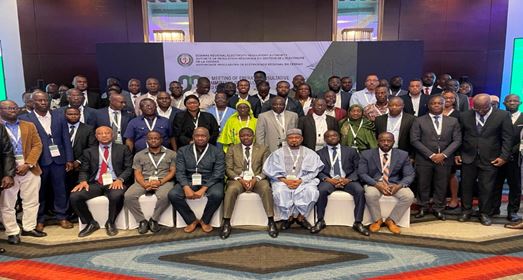By Kizito CUDJOE
The ECOWAS Regional Electricity Regulatory Authority (ERERA) is on the brink of a major breakthrough with the proposed regional grid code, aiming to unify the electricity market across West Africa.
This is seen as the key focus for engagement as ERERA’s 23rd Meeting of its Consultative Committees of Regulators and Operators comes off in Accra.
The proposed grid code seeks to harmonise rules governing the regional electricity market, focusing on system operation, market operation, system planning and connection rules. This comprehensive framework is designed to streamline operations and enhance efficiency across member states.
“We have conducted nearly a year of consultations with various stakeholders to present the results to everyone involved,” Principal Power Regulatory Officer at ERERA, Yawovi Negbegble stated. “Following their endorsement, ERERA will be able to approve the regional grid code for the West African power pool.”
The adoption of a unified grid code is expected to strengthen greater cooperation and integration within the region’s electricity sector, potentially leading to more stable and reliable power supply. This move is part of a broader strategy to deepen economic growth and improve the quality of life across West Africa.
The two-day event will, therefore, be used to review the documents relating to the appropriate pricing methodology in the context of the current evolution of the regional market and the procedures for the calculation model of the regional electricity transmission tariff as well as the grid code documents.
The Principal Power Regulatory Officer anticipated the only challenge that could arise is the buy-in coming from all the stakeholders, because it is a highly technical document. “And that is why we sent it (final copy) to all the stakeholders, so they can consult their own experts before the meeting.”
However, he noted the task-force that was given a mandate to work on the document has done a very good job – “so, we hope we will have consensus on the conclusion”.
The task-force is composed of experts from regulators, experts from grid operators in the whole region and some key resource persons who have played a key role in the energy electricity sector from Ghana and Benin.
The Chairman of ERERA, Kocou Rodrigue Laurent Tossou, in his welcome remarks during the opening session of the meeting called for productive exchanges – aiming to produce relevant recommendations that address the challenges associated with regulatory requirements in the global and regional context as we work toward establishing a competitive and appealing regional electricity market.
In addition, he suggested establishing a research and development centre to promote excellence and further development in the ECOWAS regional electricity market.
The Director General-Sierra Leone Electricity and Water Regulatory Commission (SLEWRC), Dr. Emmanuel Mannah, speaking in an interview on the sidelines of the meeting expressed hope that the meeting will conclude with a unified tariff for the region.
In response to opinions that tariffs in the region are too high, he said: “Tariffs are high because the numbers have not been too scientific. What ERERA is doing is making sure it gives national regulators the methodologies that will work.
“By so doing, it will work such that when you go into the numbers they can come down; because tariffs are based on cost, and it is those costs that we have to make sure we bring down to the point where it becomes efficient,” he said, adding that when utilities are efficient, they manage their costs; and when costs are down, tariffs will be down.
The Executive Director-Public Utilities regulatory Commission (PURC), Dr. Ishmael Ackah, also responding to a question on increasing tariff said: “Electricity tariffs are a function of two main things: one is the cost of production, transmission and distribution, and the other is macroeconomic indicators”.
Furthermore, he opined that: “When it comes to cost – which is also a function of the input you are using, the technology and all those – analysis of the tariff will show that about 60 percent of it goes to generation.
“If you are for instance using a thermal plant, you need to pay for capacity and pay for the fuel. If you are using hydro, you don’t pay for the water. So, depending on the type of technology you use, tariffs can come down.”
For tariffs to go down, he said, there is a need to incorporate more renewables, cheaper sources – and not just renewables but renewables that are competitively procured to ensure that prices are affordable. In the case of Ghana, he said, the Integrated Power Sector Master Plan is advocating for more solar going forward, from now to about 2030.










